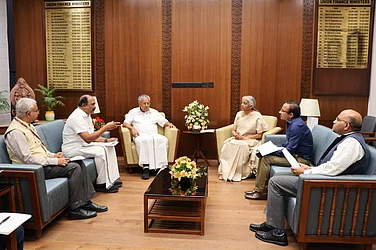The images of Laxmi, Ganesh, Ram, and Sita along with other Hindu deities arranged on a shelf coming out of an old but lately plastered wall in front of a closed shutter seem to be a part of a mundane Hindu household. But no, this is not where you have stepped in. It is the ground floor of 150-year-old iconic Sunehri Bagh Masjid that has been plunged into controversy since December 24 when New Delhi Municipal Council (NDMC) issued a public notice seeking people’s comments on whether the historic mosque should be demolished allegedly to clear the traffic congestion.
While the row over the masjid is making it a new political hotspot in the heart of the national capital, two families —one Hindu and the other Muslim— whose bread and butter are dependent on their shops in the mosque premises are clueless about their future. Standing within the roundabout at the intersection of Maulana Azad Road, Motilal Nehru Marg, and Kamraj Road, this masjid not only bears history. For them, it is livelihood.
After entering the masjid gate and passing by the wazukhana, one finds J K Gupta. In his mid-60s, sporting a red tilak, Gupta is now busy responding to the media calls. “Since the controversy broke out, media people are calling me for bites. What can I say? I have hardly seen any traffic jams here. It is just like any other roundabout in the city,” says Gupta, who has been running a small hotel on the ground floor of the premises for almost 35 years.

Gupta’s father used to have a small tea stall near Udyog Bhawan. “In 1955, the Masjid committee asked him to shift inside the complex and since then the shop has been here. In 1975, for the first time, we started paying rent. Then, it was Rs. 150 and, gradually, it increased every three years,” says Gupta. As he continues sharing his memories, a middle-height person in his mid-30s joins him: “Will you take tea Gupta Ji?” This is Salim, says the old man. Salim is the only other person who runs a shop that deals in scraps on the masjid premises. His father got the space around 40 years ago and it has been just a decade that he has taken over due to his father’s illness.
“We have been doing our business for years. Religion doesn’t matter here. We exchange sewai and halwa in each other’s occasions. Celebrating Diwali and Eid together is part of our culture,” says Salim referring to the inherent syncretism of India. “Even in Chandni Chowk area, you can find several Hindu shops within the mosque complexes and this is how it is,” adds Gupta.
Gupta has though kept his shop closed since the controversy erupted. Salim is running it. However, one can hardly find any customer there. Pointing out at the clean frontier of his shop —quite an unusual scene for a waste dealer— Salim says, “I always keep it clean. We cooperate with the government in every possible way. Whenever any VIP goes through these roads, I close the shop even after bearing the financial loss. You can’t see traffic congestion here. I don’t know why they are trying to demolish it.”
It is around 12.15 pm on Friday. As the people start congregating for the weekly prayer, Salim excuses himself. The Maulana has asked the beggars gathering around the mosque —a common sight in most of the Indian mosques on Jumma— to sit in an organised manner to not disturb the traffic. While arranging them in order, Salim says, “They don’t spill over the roads but we must be careful.”

As the crowd gets thicker, one of the employees at the Ministry of External Affairs (MEA) before entering for Namaaz, says, “This is the only mosque in the vicinity. We from the nearby offices come here for Friday prayers. Even we don’t bring our cars as traffic can be disrupted.” However, Hussain, who has been coming to this mosque for almost 30 years, notes that he has never seen any congestion on the road. “The traffic during the office time is mostly due to offices nearby. The masjid remains vacant most of the time in other days. But in Jumma as well, you cannot find large crowd,” he adds.
Hussain claims to have offered namaz here even with former President APJ Abdul Kalam. “We have always been cooperative. During the winter session of the Parliament barring a few times, we didn’t even hold namaaz. What else could we do?” he asks. Earlier, people used to offer namaaz in the adjacent park within the roundabout. But it was discontinued due to the objections from government. “We then shifted to the roof and we were told that it might pose security threats and we stopped it,” says Imran (name changed on request) who works in a nearby central government office. The Imam was also asked to switch off the lights near the windows of the mosque facing Kamraj Road to avoid ‘visual disturbance’, he adds. The mosque now holds Jumma namaaz in three phases to avoid traffic congestion.
The controversy around the mosque dates back to 2021 when the Central Vista project started. Masroor Siddiqi, a senior advocate who follows these cases closely, says, “In 2021, attempts were made to remove the masjid. But the Minister of Housing and Urban Affairs, Hardeep Singh Puri, in no uncertain terms said that the heritage buildings would be spared.” Sunehri Bagh masjid is enlisted as a Grade-III heritage site in the list of the Heritage Conservation Committee (HCC). According to HCC, “Heritage Grade-III comprises buildings and precincts of importance for townscape; that evoke architectural, aesthetic or sociological interest.”
Notably, the masjid is also one of the 123 waqf board properties in Delhi that have lately witnessed court battles over their ownership. The Central government earlier challenging the petition of the Waqf board in the HC said that these properties —mosques, dargahs, and graveyards— had been mutated to be the property of the Government of India during 1911-14. They also said that a two-member committee had been formed in 2016 to hear all the stakeholders. However, the Waqf board said that they heard about the committee only in 2021.
The Delhi HC, nevertheless, at that point, gave the government a go-ahead with a caveat that the religious places and their regular engagements should not be disturbed. Following the court order, the government pasted inspection notices on the walls of a few masjids including the New Delhi Jama Masjid located just opposite the Parliament building in August 2023.
The matter of Sunheri masjid, however, came up following a letter from an ACP Traffic in June, 2023, says Siddiqi. Expressing his annoyance over the public notice of NDMC that sought public opinion, he asks, “What is this public notice for? Can the public decide whether the mosque is responsible for traffic congestion? They should have formed an expert committee instead to probe the matter.” As per different media reports, NDMC has received more than 60,000 suggestions in seven days.
Siddiqi, who also runs an organisation named Muslim Sehar Foundation, in his submission to NDMC points out the legal loopholes in the order. “The public notice has been issued under section 11(n)(p) of NDMC Act that deals with the construction, maintenance, alteration, and improvement of public streets and removal of obstructions and projections in or upon streets. However, Masjid Sunehri Bagh has been there far before the development and Lutyen even left it intact. It neither amounts to obstruction nor has any projection onto the road,” he says.
Following the public notice, the Imam of the Masjid Abdul Aziz approached the Delhi High Court and sought its intervention. During the hearing, the NDMC said, “This is just a procedural notice. Your Lordships may simply adjourn this. The decision has to be taken by the HCC, not by us. HCC has to be re-constituted and nothing is going to happen. How can they have grievances for the procedure? I can’t even touch a brick without HCC’s permission.” Interestingly, Siddiqi points out that Chief Architect of NDMC who issued the public notice also is the member of HCC and there is a conflict of interest. The next hearing is scheduled for January 11.
Amidst the controversy and media attention, Salim and Gupta continue sharing their brotherly relations. “We don’t know what future lies ahead of us, but we share our concerns and love,” they say. As Gupta walks back to his closed shop, Salim gets ready for namaaz. They know the time of the congregation. In the absence of a loudspeaker, azaan doesn’t work anymore as a clock, Imran sighs.



























